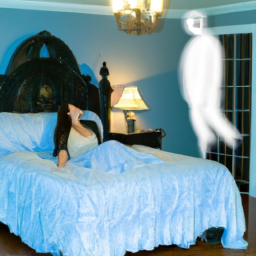Ever thought about why you experience vivid dreams that abruptly wake you in the middle of the night? The human mind is intricate and enigmatic, and dreams are no different. This article will explore the scientific reasoning behind these powerful dreams that disturb our sleep.
During the rapid eye movement (REM) stage of sleep, our brain becomes incredibly active, creating a fertile ground for dream formation. This increased brain activity, coupled with emotional processing, can contribute to the vividness of our dreams.
Additionally, stress and anxiety can act as triggers, leading to more intense and disruptive dream experiences. Certain medications and substances can also affect the intensity of our dreams. Sleep disorders and disruptions, such as sleep apnea or insomnia, can further exacerbate the situation. Even our sleep environment and hygiene practices, as well as our diet and nutrition, can impact the quality of our dreams.
In the following sections, we will explore techniques for managing these vivid dreams and improving our sleep. However, if these dreams persist or significantly affect your daily life, it may be necessary to seek professional help. So, let’s dive into the intriguing world of vivid dreams and uncover the reasons behind their disruptive nature.
Key Takeaways
- Increased brain activity during the REM stage of sleep is responsible for vivid dreams that wake us up.
- Factors such as stress, anxiety, medications, and substances can contribute to the intensity of these dreams.
- Sleep disorders like sleep apnea and insomnia can exacerbate vivid dreams and disrupt sleep patterns.
- Creating a comfortable sleep environment, practicing good sleep hygiene, and exploring techniques like dream journaling and relaxation can help manage and reduce the intensity of vivid dreams.
The Role of REM Sleep in Dream Formation
REM sleep is the fascinating stage of slumber where dreams come alive, leaving us captivated and sometimes startled awake. During REM sleep, our brains undergo a series of distinct stages, each with its own characteristics and functions. These stages are essential for dream formation and are responsible for the vividness of our dreams.
One of the key features of REM sleep is the increased brain activity, which is believed to be linked to the vividness of our dreams. This heightened brain activity allows for the creation and recall of complex dream scenarios. Dream recall, or the ability to remember our dreams upon waking, is closely associated with REM sleep. Research suggests that the more time spent in REM sleep, the more likely we are to remember our dreams. This could explain why some individuals have more vivid dreams that wake them up compared to others.
Transitioning into the subsequent section about increased brain activity and emotional processing, it is worth noting that REM sleep not only plays a role in dream formation but also in emotional regulation. The increased brain activity during REM sleep is thought to facilitate the processing and integration of emotions experienced during waking hours, which may contribute to the intensity and vividness of our dreams.
Increased Brain Activity and Emotional Processing
During deep sleep, my mind becomes a bustling metropolis of heightened neural activity, engaging in intense emotional processing that rivals the grandest fireworks display. This increase in brain activity during REM sleep, or rapid eye movement sleep, is responsible for the formation of vivid dreams that often wake me up.
The brainwave patterns observed during this stage of sleep show a level of activity similar to that of being awake. These patterns, known as theta and beta waves, indicate a high level of neuronal firing and communication. This heightened state of brain activity allows for the creation of vivid and lifelike dreams.
Furthermore, this increased brain activity during REM sleep is closely tied to emotional regulation. The amygdala, a key brain structure involved in processing emotions, becomes highly active during this stage. This heightened emotional processing during REM sleep may explain the intense emotions experienced in vivid dreams. It is thought that this emotional regulation process serves an important function in our overall mental well-being. By processing and regulating emotions during sleep, our brain prepares us for the challenges and experiences of the waking world.
Transitioning into the subsequent section about stress and anxiety as triggers for vivid dreams, it is important to understand the role of emotional processing during REM sleep. The heightened brain activity and emotional regulation that occur during this stage may be particularly influenced by stress and anxiety, leading to the occurrence of vivid dreams that wake us up.
Stress and Anxiety as Triggers for Vivid Dreams
Feeling overwhelmed and anxious can unleash a torrent of intense emotions that inundate your sleeping mind, setting the stage for unforgettable dreamscapes. Stress and anxiety are known triggers for vivid dreams that wake you up. When we experience stress, our brain’s emotional processing centers become hyperactive, leading to heightened activity during REM sleep, the phase when dreams occur.
This increased brain activity can result in dreams that feel incredibly real and vivid. Managing stress and anxiety is key to reducing the frequency and intensity of these disruptive dreams. Incorporating relaxation techniques into your daily routine can help calm your mind and promote better sleep. Deep breathing exercises, meditation, and progressive muscle relaxation are effective stress management techniques that can help alleviate anxiety and promote a more restful sleep.
By incorporating these relaxation techniques into your daily routine, you can create a sense of calm and reduce the likelihood of vivid dreams that wake you up. Transitioning into the subsequent section about medications and substances that affect dream intensity, it is important to explore the potential impact of these factors on your dream experiences.
Medications and Substances That Affect Dream Intensity
If you’re taking certain medications or substances, you might be in for a wild ride when it comes to the intensity of your dreams! It is well-known that certain medications can affect the quality and intensity of our dreams.
For example, antidepressants such as selective serotonin reuptake inhibitors (SSRIs) and tricyclic antidepressants (TCAs) have been known to cause vivid and intense dreams. These medications work by altering the levels of neurotransmitters in the brain, which can lead to changes in dream patterns.
In addition to medications, certain substances can also have an impact on dream intensity. Alcohol, for instance, can suppress REM sleep, the stage of sleep where most dreaming occurs. This can result in a rebound effect, where REM sleep is increased once the effects of alcohol wear off, leading to more vivid and intense dreams.
Other substances, such as nicotine and caffeine, can also affect dream intensity. Nicotine, found in cigarettes and other tobacco products, has been shown to suppress REM sleep, while caffeine, found in coffee, tea, and energy drinks, can disrupt sleep patterns and lead to more intense dreams.
Understanding the relationship between medications, substances, and dream intensity is important for individuals who experience vivid dreams that wake them up. It can help identify potential triggers and allow for adjustments in medication or substance use to achieve a better night’s sleep.
Moving on to the next topic of sleep disorders and disruptions…
Sleep Disorders and Disruptions
To better understand sleep disorders and disruptions, you should be aware of how they can significantly impact the quality and restfulness of your sleep. Sleep disorders, such as insomnia, sleep apnea, and restless leg syndrome, can disrupt the normal sleep patterns and prevent you from reaching the deep, restorative stages of sleep. This can lead to daytime drowsiness, difficulty concentrating, and decreased overall well-being.
Sleep disorders and mental health are closely linked. People with mental health conditions, such as anxiety and depression, often experience disruptions in their sleep patterns. In turn, these sleep disruptions can worsen their mental health symptoms, creating a vicious cycle. Addressing both the sleep disorder and the underlying mental health condition is crucial for improving overall well-being.
The impact of sleep disruptions on overall well-being cannot be overstated. Lack of quality sleep can affect your mood, energy levels, and cognitive function. It can also increase the risk of developing chronic health conditions, such as obesity, diabetes, and cardiovascular diseases. Additionally, sleep disruptions can impair your immune system, making you more susceptible to illnesses.
Understanding the relationship between sleep disorders, mental health, and overall well-being is essential for addressing the issue.
In the next section, we will explore the psychological factors and dream content that can contribute to vivid dreams and frequent awakenings during sleep.
Psychological Factors and Dream Content
Psychological factors and dream content can provide valuable insights into the intricacies of our subconscious minds, unraveling the hidden depths of our thoughts and emotions. Dream interpretation and symbolism have long been studied to understand the meaning behind our vivid dreams and their impact on our mental health. By analyzing the content of our dreams, psychologists can gain a better understanding of our fears, desires, and unresolved conflicts.
The relationship between dream content and mental health is a complex one. Dreams can serve as a reflection of our current emotional state, acting as a natural outlet for our subconscious thoughts. For example, individuals experiencing high levels of stress may have dreams that feature chaotic and unsettling scenarios. On the other hand, those with anxiety disorders may have recurring dreams that reflect their persistent worries.
To illustrate this relationship, consider the following table:
| Dream Content | Mental Health |
|---|---|
| Nightmares | Anxiety |
| Falling | Insecurity |
| Flying | Freedom |
Understanding the connection between dream content and mental health can be crucial in providing therapeutic interventions. By exploring the symbolism and themes in our dreams, psychologists can help individuals gain insights into their underlying issues and work towards resolution.
Transitioning to the subsequent section about sleep environment and sleep hygiene practices, it is important to create a conducive environment for restful sleep.
Sleep Environment and Sleep Hygiene Practices
Creating a comfortable sleep environment and practicing good sleep hygiene can greatly enhance your ability to achieve restful and rejuvenating sleep. To ensure a comfortable sleep environment, it’s crucial to invest in a high-quality mattress that provides adequate support for your body. A comfortable mattress can help alleviate any physical discomfort that may disrupt your sleep and contribute to vivid dreams.
Additionally, creating a calming bedtime routine can signal to your body that it’s time to unwind and prepare for sleep.
To optimize your sleep environment and promote better sleep, consider the following tips:
- Keep your bedroom cool and well-ventilated to create an optimal sleep temperature.
- Use blackout curtains or an eye mask to eliminate any sources of light that may interfere with your sleep.
- Reduce noise levels by using earplugs or a white noise machine.
- Remove all electronic devices from your bedroom to minimize distractions and promote a peaceful atmosphere.
By implementing these sleep hygiene practices and optimizing your sleep environment, you can increase the likelihood of achieving deep and uninterrupted sleep, which may reduce the occurrence of vivid dreams that wake you up.
Transitioning into the next section about the impact of diet and nutrition on dream quality, it’s important to consider how our food choices can influence our sleep patterns and dream experiences.
The Impact of Diet and Nutrition on Dream Quality
Improve your dream quality by considering the impact of your diet and nutrition choices. The food we consume has a significant influence on our overall health, including our sleep patterns and dream quality.
One factor to consider is the impact of exercise on dream quality. Engaging in regular physical activity can enhance the quality and vividness of dreams. Exercise increases blood flow and oxygen levels in the body, which can stimulate brain activity during sleep and lead to more intense and memorable dreams.
Another important aspect to consider is the effects of caffeine on dream intensity. Consuming caffeine, such as coffee, tea, or energy drinks, can disrupt the sleep cycle and decrease the amount of time spent in deep REM sleep, where most dreams occur. This can result in less vivid dreams or even difficulties in remembering them.
To manage vivid dreams and improve sleep, it’s essential to establish a healthy diet and make conscious nutrition choices. Incorporating a balanced diet with adequate nutrients and avoiding excessive caffeine intake can contribute to better dream quality.
In the next section, we’ll explore techniques for managing vivid dreams and improving sleep without compromising our overall well-being.
Techniques for Managing Vivid Dreams and Improving Sleep
To effectively manage intense dreaming and enhance sleep quality, it’s important to adopt techniques that promote relaxation and calmness before bedtime. Here are four techniques that can help improve sleep quality and manage vivid dreams:
-
Establish a bedtime routine: Creating a consistent routine before bed helps signal to your body that it’s time to wind down and prepare for sleep. This can involve activities such as reading, taking a warm bath, or practicing relaxation exercises.
-
Practice relaxation techniques: Engaging in relaxation techniques, such as deep breathing or progressive muscle relaxation, can help calm your mind and body before sleep. These techniques promote a sense of relaxation and reduce the likelihood of intense dreaming.
-
Keep a dream journal: Writing down your dreams upon waking can help you gain insight into your dream patterns and emotions. This awareness can assist in identifying potential triggers and finding ways to manage them.
-
Explore lucid dreaming techniques: Lucid dreaming is the ability to become aware that you are dreaming while still in the dream. Techniques such as reality testing, keeping a dream journal, and practicing mindfulness during the day can increase the likelihood of lucid dreaming and offer a sense of control over your dreams.
By implementing these techniques, you can improve sleep quality and potentially reduce the intensity of your dreams. However, if vivid dreams persist and significantly disrupt your daily life, it may be necessary to seek professional help for further evaluation and guidance on managing your dreams.
When to Seek Professional Help for Vivid Dreams
If your intense dreaming continues to disrupt your daily life and leaves you feeling trapped in a never-ending whirlwind of emotions, it may be time to seek professional help. Vivid dreams can sometimes be a normal part of the sleep cycle, but when they become frequent and overwhelming, it can be beneficial to seek the assistance of a mental health professional.
One option to consider is seeking therapy. A therapist can help you explore the underlying causes of your vivid dreams and provide guidance on how to manage them. They can also teach you coping mechanisms and relaxation techniques that can aid in improving your overall sleep quality.
Another helpful technique is dream journaling. Keeping a record of your dreams can provide insight into patterns, triggers, and themes that may be contributing to their intensity. By recording your dreams upon waking, you can begin to identify any recurring symbols or emotions that arise, allowing you to gain a better understanding of their meaning and potential impact on your waking life.
Remember, seeking professional help is not a sign of weakness, but rather a proactive step towards improving your well-being. A mental health professional can provide the support and guidance needed to navigate and manage the intensity of your vivid dreams, ultimately helping you achieve a better night’s sleep and a healthier mindset.
Frequently Asked Questions
How long do vivid dreams typically last?
Vivid dreams typically last for a few minutes to half an hour. The duration of intense dreams can vary based on factors like sleep cycles and individual differences. Sleep disorders, such as insomnia or sleep apnea, can impact dream intensity and duration. These conditions may affect the quality of sleep, leading to more fragmented and vivid dreams. Understanding the relationship between sleep disorders and dream intensity can help in managing and improving sleep quality.
Can vivid dreams be a sign of a mental health condition?
Vivid dreams can indeed be a sign of a mental health condition. Research suggests that there’s a strong relationship between vivid dreams and anxiety. People with anxiety disorders often experience intense and vivid dreams that can be distressing.
Additionally, there’s also a connection between vivid dreams and depression. Depressed individuals may have more frequent and vivid dreams, which can be a reflection of their emotional state.
Therefore, if you’re experiencing vivid dreams, it may be worth considering your mental health.
Is there a way to prevent or reduce the occurrence of vivid dreams?
To prevent or reduce the occurrence of vivid dreams, one can try lucid dreaming techniques. These techniques involve training oneself to be aware that they’re dreaming and then actively participating in the dream.
By doing so, individuals may be able to control the content and intensity of their dreams. Additionally, managing stress levels can have an impact on dream intensity. High levels of stress can lead to more vivid and disruptive dreams, so practicing stress management techniques may help in reducing their frequency.
Can certain foods or drinks contribute to the intensity of dreams?
Certain foods and drinks can indeed contribute to the intensity of dreams and impact sleep quality. The consumption of food and drinks that contain high levels of caffeine, such as coffee or energy drinks, can stimulate brain activity and lead to vivid dreams.
Additionally, spicy foods, alcohol, and certain medications can also influence dream intensity. It’s important to be mindful of our diet choices and their potential effects on our sleep and dream experiences.
Are there any specific sleep positions that can lead to more vivid dreams?
Sleep positions can indeed have an impact on dream intensity. Research suggests that sleeping on your stomach can lead to more vivid dreams. This position may increase brain activity during sleep, potentially enhancing the intensity of dreams.
Additionally, sleeping on your back may also promote more vivid dreams. However, it’s important to note that individual experiences may vary, and other factors such as sleep quality and personal sleep habits can also influence dream intensity.
Conclusion
In conclusion, understanding the reasons behind vivid dreams that wake us up can help us navigate our sleep experiences better. By exploring the role of REM sleep, brain activity, stress, medications, sleep disorders, sleep environment, and diet, we can gain insight into the factors influencing dream intensity.
It’s important to manage vivid dreams and prioritize good sleep hygiene to improve overall sleep quality. If vivid dreams persist and significantly impact daily life, seeking professional help may be beneficial.
Remember, a good night’s sleep is essential for our physical and mental well-being, so let’s strive for peaceful and restorative slumbers.









